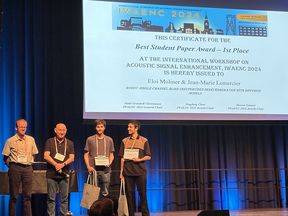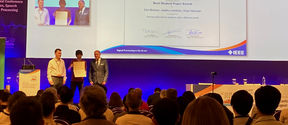Best Student Paper Award for Acoustics Lab doctoral student Eloi Moliner
The award-winning paper discusses how to solve inverse problems in audio processing

Aalto Acoustics Lab's doctoral student Eloi Moliner won the Best Student Paper Award at the International Workshop on Acoustic Signal Enhancement (IWAENC) in Aalborg, Denmark, on Thursday 12 September 2024. The joint first author of the paper was Mr. Jean-Marie Lemercier, a PhD student at the University of Hamburg. The IWAENC workshop, which is held every two years, was attended by around 200 experts in audio and acoustics.
Eloi is a third-year doctoral student at the Aalto School of Electrical Engineering. He studies deep learning and its application to audio enhancement. In this paper, Eloi and his supervisor Professor Vesa Välimäki collaborated with researchers from the University of Hamburg, Germany.
The award-winning paper shows how speech recordings can be improved by removing the room reverberation effect using unsupervised machine learning. The method is based on a diffusion model, which is one of the hot topics in deep learning. This work is an example of explainable AI, as the method provides as an auxiliary result the estimated room response, which it extracts from the speech.
Eloi Moliner also won awards at the 2023 IEEE ICASSP conference last year and at the International Digital Audio Effects Conference DAFX22 two years ago. Eloi plans to defend his doctoral thesis next year.
Congratulations to Eloi and Jean-Marie!
Click here to read the article.Many examples of processed speech related to this work are available here.
More information
Vesa Välimäki
Professor of audio signal processing
Department of Information and Communication Engineering / Acoustics Lab
School of Electrical Engineering
Aalto University


The award-winning paper discusses how to solve inverse problems in audio processing

The Aalto Acoustics Lab is a multidisciplinary research center focusing on audio processing and spatial sound technologies. The laboratory gathers professors and research teams from three different units: Department of Information and Communications Engineering, Department of Computer Science, and Department of Art and Media.


